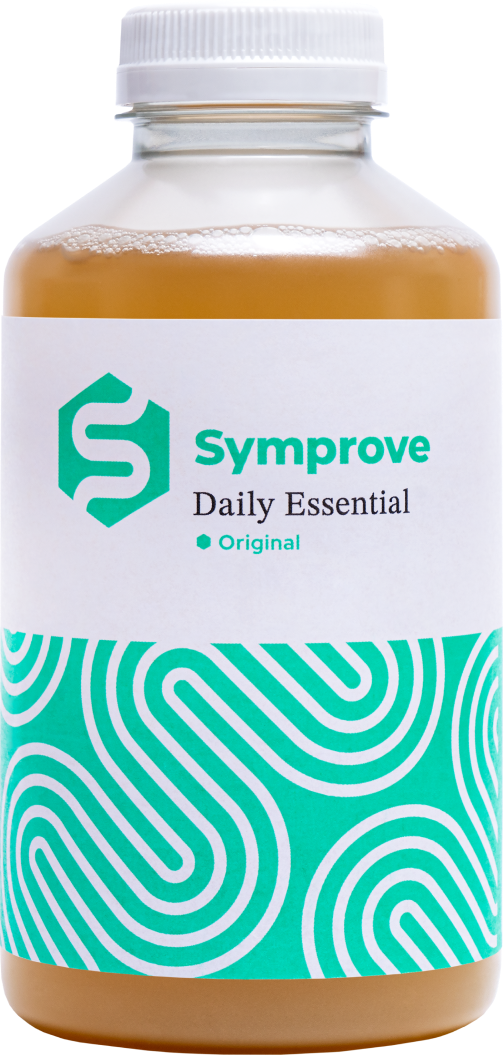Why is plant-based eating beneficial for the gut microbiome?
The British Dietetic Association defines a ‘plant-based diet’ as one which is ‘based on foods derived from plants, including vegetables, wholegrains, legumes, nuts, seeds and fruits, with few or no animal products.’ These plant foods provide a wide range of indigestible starches which help ‘good’ bacteria to thrive and keep the microbiome at optimum levels for health. In contrast, diets which are low in fibre and plant material, and are high in fat, sugar, salt and animal proteins typically favour the growth of ‘bad’ bacteria leading to dysbiosis.
What’s the difference between plant-based eating and veganism? Do you have to go vegan to experience the full benefits on the microbiome?
The term ‘plant based’ and ‘vegan’ are sometimes used interchangeably but there are technical differences. The term ‘plant-based’ is an umbrella term describing a spectrum of diets from flexitarianism through to vegetarianism and veganism. For a diet to qualify as ‘plant-based’ at least two-thirds of it should be from plant foods and one-third can be from animal products.1 Veganism is at the ‘strictest’ end of the spectrum and excludes all animal products.
You don’t have to be completely vegan to enjoy the health benefits of a plant-based diet. Moderate amounts of meat, fish and dairy within UK dietary guidelines, alongside a diet rich in plant foods, should give you the same health benefits on the gut microbiome.
Could you share the latest research/recommendations regarding plant-based eating and gut health?
The current UK recommendations are to eat at least 5/day of fruit and vegetables, this is about ⅓ of our daily food intake. However, a study by Imperial College in 20172 found you would need to eat 10 portions of fruit and veg each day to gain the maximum protection against disease and premature mortality. In practice, one would need to consume 800g of fruit and veg/day (10 x 80 g portions).
Consuming 800g of fruit/veg per day was found to be associated with:
- a 24% reduced risk of heart disease
- a 33% reduced risk of stroke
- a 28% reduced risk of cardiovascular disease
- a 13% reduced risk of total cancer
- a 31% reduction in dying prematurely
Although these statistics are impressive, it’s worth bearing in mind that they were calculated in comparison to not eating any fruit and vegetables at all. Also, with the majority of the population not even consuming the 5/day recommendation, increasing this to 10/day may be too unrealistic of a target. However, it is interesting to see just how many fruit and vegetables are needed in the diet, irrespective of consumption of animal protein, for health benefits.
We know that low grade inflammation is a risk factor and trigger for many non-communicable diseases. Suggested mechanisms for actions are that fruit and vegetables help improve gut health, attenuate inflammation and promote healthy immune functioning. Aiming to eat 5-10 portions of a large variety of fruits, vegetables will also help to meet the recommended fibre intake (30g/day).
Are there certain types of plant-foods that are particularly beneficial for gut health? If so, which ones and why?
Certain plants contain ‘prebiotic’ fibre, which promotes the growth of beneficial gut bacteria (e.g., lactobacillus and Bifidobacterium). These fibres ferment in the colon which leads to the production of energy, metabolites and micronutrients. Prebiotics are found naturally in a range of fibre-rich foods such as:
- Fruit: nectarines: watermelon, plums, pomegranate, grapefruit, ripe bananas
- Vegetables: artichokes, cabbage, onions, shallots, spring onions, leeks, garlic, asparagus, broccoli, Brussel sprouts, fennel
- Grains: wholewheat, rye, barley
- Legumes and nuts: chickpeas, lentils, beans, pistachios, cashews, almonds
Different types of fibres have different characteristics and functionalities (e.g., solubility, viscosity, fermentability). Thus, eating a diverse and varied fibre-rich diet is important to ensure that a range of different fibre types are consumed.
Do short-term increases in plant-based foods (i.e., Veganuary) benefit gut health? Should these changes be long-term?
There has been some research to show that gut microbiomes can change within 24 hours of a new diet.3 However, research into plant-based diets and gut health is a relatively new field. It would be sensible to assume that these dietary changes need to be made for the long-term to sustain a healthy microbiome and gain the full health effects.
Do vegans have healthier gut microbiomes and overall gut health compared with non-vegans?
A recent literature review4 reported that vegetarian/vegan diets were effective at promoting a diverse range of healthy gut bacteria. In addition to this, a diet rich in plant-based foods is also higher in polyphenols (bioactive compounds, of which the majority (90-95%) are utilised by the gut microbiome). Polyphenols increase the gut bacteria Bifidobacterium and Lactobacillus, which have been shown to be anti-pathogenic and anti-inflammatory as well as offer some cardiovascular protection.
The high-fibre vegan diet encourages the growth of ‘good’ gut bacteria which then ferment some types of fibre (e.g., prebiotics, resistant starch etc.) to produce metabolites such as short-chain fatty acids (SCFAs). These have the potential to provide beneficial health effects such as provision of energy substrates, regulation of immunity and regulation of the intestinal functions. However, we do need to be mindful that this research is based on well balanced vegan diets. Simply removing animal foods and replacing them with non-nutritious foods may not give the same changes in gut microbiome and health. Plus, animal products (e.g., lean meats, fish, dairy etc.) are a high-quality source of important nutrients such as protein, omega-3-fatty acids, zinc and calcium.
How can HCPs encourage people to eat more plant-based foods? Do you have some simple and practical suggestions?
My ‘rule of thumb’ is to make sure that every square meal is at least ⅓ – ½ plant based. This would mean in practice having at least 2 portions of fruit and vegetables (including fresh, canned, frozen, dried and juiced varieties of fruits and vegetables) with each meal and always opting for the high fibre varieties of carbohydrate foods. I advise people to try and make up snacks from healthy plant foods such as unsalted nuts/seeds or fresh/dried fruit. Additionally, it is helpful to plan meals around the plant-based foods, rather than adding them on as an ‘afterthought’. To help with this I recommend keeping a good stock of fresh, frozen or tinned fruit and veg to have to hand. A day’s example would be:
- Breakfast: fruit with wholegrain cereal or mushrooms/cherry tomatoes with egg on wholemeal toast
- Lunch: vegetable-based soups or sandwiches with a salad filling or side salads. Try to finish the meal with a piece of fruit
- Dinner: adapt a meat-based recipe with plant foods. A great example is chile con carne with kidney beans or spaghetti Bolognese made with ½ meat and ½ red lentils. Veg can also be finely chopped or grated into the sauces.
What sorts of changes may people experience when they increase their intake of plant-based foods?
In the short-term people may find some mild digestive discomfort with symptoms such as wind, bloating and loose stools. I’d recommend building up fibre intakes gradually to allow the gut time to adjust and thus minimise any gastro-related ‘side effects’.
Can you still eat a healthy and balanced plant-based/vegan diet if you have IBS? How so?
Yes, although the caveat is that dietary advice would depend on individual tolerances/sensitivities and symptom profile. ‘First line’ advice for IBS focuses on encouraging dietary balance and removing bowel stimulants/irritants such as caffeine, spice, excess fat and alcohol. We may recommend the Low FODMAP (fermentable, oligosaccharides, disaccharides, monosaccharides and polyols) Diet (LFD) if first-line dietary advice is not sufficient. The LFD is a common approach which restricts certain foods containing short-chain carbohydrates as a management tool in patients with IBS. Psychological therapies and other techniques (e.g., mindfulness and yoga) have been proven to help manage symptoms of IBS too.
Which nutrients should we be aware of on a vegan/plant-based diet?
The Vegetarian Society5 and Vegan Society6 recognise that a vegan diet could increase the risk of inadequate dietary intake of the following nutrients: essential fat/ Omega 3 fats, vitamin B12, calcium, iodine, iron, protein, vitamin D and zinc. The Vegan Society also recommends planning for additional nutrients such as Selenium, Vitamin K and Vitamin A where all animal products are absent. If nutrient needs are not met through natural or fortified foods, then supplements will need to be taken. Unless someone is regularly consuming fortified foods then, at a minimum, I would advise clients to supplement with B12 and Vitamin D and consider supplements which contain iodine and omega 3.
Do you have any useful websites or resources for those wishing to try a plant-based/vegan diet?
I would highly recommend the Vegan Society’s meal planner and for those wishing to reduce meat take a look at: https://www.theflexitarian.co.uk/recipes/
Footnotes -
[1] WCRF/AICR. Food, Nutrition and Physical Activity and the Prevention of Cancer: a global perspective. 2007. Washington, AICR.
[2] Dagfinn. A et al., Fruit and vegetable intake and the risk of cardiovascular disease, total cancer and all-cause mortality—a systematic review and dose-response meta-analysis of prospective studies, International Journal of Epidemiology, Volume 46, Issue 3, June 2017, Pages 1029–1056, https://doi.org/10.1093/ije/dyw319
[3] Glick-Bauer, M.; Yeh, M.-C. The Health Advantage of a Vegan Diet: Exploring the Gut Microbiota Connection. Nutrients 2014, 6, 4822-4838.
[4] Tomova. A et al., The Effects of Vegetarian and Vegan Diets on Gut Microbiota. Fronts. Nutr 2019 https://doi.org/10.3389/fnut.2019.00047
[5] The Vegetarian Society (https://vegsoc.org/)
[6] The Vegan Society (https://www.vegansociety.com)



